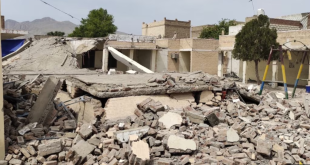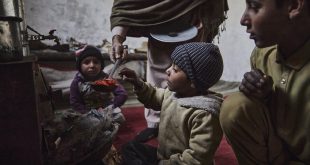KABUL – A tentative ceasefire between Iran and Israel has brought a halt to the hostilities that recently pushed the region to the brink of a wider war. But for Afghanistan, the end of the conflict marks the beginning of a different kind of crisis — one that is unfolding quietly across its western border.
As the guns fall silent, thousands of Afghan refugees who had sought shelter in Iran are being forced to return home. Many, like 25-year-old YouTuber Mahnoor Naimi, had spent years trying to build new lives in Iranian cities, working in garment factories or taking odd jobs. But the war, coupled with Iran’s growing deportation campaign, has pushed them out.
Naimi’s recent video, filmed from a deportation camp near the Sang-e Safid border crossing, paints a harrowing picture of life in limbo: children crying from hunger, exhausted families huddled under makeshift tents, and widespread fear of being forgotten. “Whatever Afghanistan is, it is ours,” she said, holding back tears, “but we have nothing to return to.”
Iran hosts an estimated 4.5 million Afghans, most of them undocumented and vulnerable. With Iranian authorities cracking down on migrants — a campaign accelerated during the recent war — thousands are being bused to border camps and sent back. Human Rights Watch has described these camps as “veritable prisons,” reporting abuse and neglect.
Now, Afghanistan faces a flood of returning refugees — many of whom left to escape poverty, violence, or persecution — and the country is ill-prepared to receive them. Employment is scarce. Humanitarian aid is drying up. And basic services like food, shelter, and healthcare are already stretched thin.
The United Nations says its Afghanistan Humanitarian Response Plan has received just 18 percent of its funding as of June 19, leaving millions — including women, children, and displaced people — without support.
Throughout the Iran-Israel conflict, the Taliban government in Kabul maintained a strikingly restrained tone. Apart from a brief statement by Foreign Minister Amir Khan Muttaqi condemning Israeli strikes and expressing solidarity with Tehran, there were no public demonstrations or escalatory rhetoric. No flag burnings, no anti-American chants — a sharp contrast from past Afghan governments, some of which openly aligned with Iran’s regional military activities.
Analysts say this muted response was deliberate. The Taliban, still isolated internationally and under heavy sanctions, cannot afford to pick sides in a conflict that pits two of its key strategic concerns — Iran and the United States — against each other. While Iran remains Afghanistan’s main source of energy and trade, the Taliban continue to signal interest in eventually opening dialogue with Washington, driven largely by economic desperation.
The war may have paused, but Afghanistan’s economic fragility is growing. Bilateral trade with Iran hit $2.2 billion in the first nine months of 2024, largely driven by imports of fuel and gas. With no formal recognition and few trade options, the Taliban have grown increasingly dependent on Tehran — a relationship born out of necessity, not ideology.
This dependency comes at a time when both countries are reeling from sanctions. Iran’s exports to Afghanistan provide it with a rare economic outlet, while Kabul leans on Iranian energy to keep the country running. Any disruption — from further sanctions to border closures — could tip Afghanistan deeper into humanitarian crisis.
The post-ceasefire landscape also raises pressing questions for Washington. Having spent over two decades and trillions of dollars in Afghanistan, the U.S. now finds its former ally drifting deeper into the orbit of a sanctioned regional rival. While Washington has maintained a policy of non-engagement with the Taliban, analysts warn that leaving Afghanistan untethered could backfire.
“A destabilized Afghanistan — fraught with desperation, isolation, and volatility — risks becoming a nexus of renewed extremism and proxy conflict,” warned one regional expert. “Ignoring this crisis won’t make it go away.”
 Afghanistan Times
Afghanistan Times




